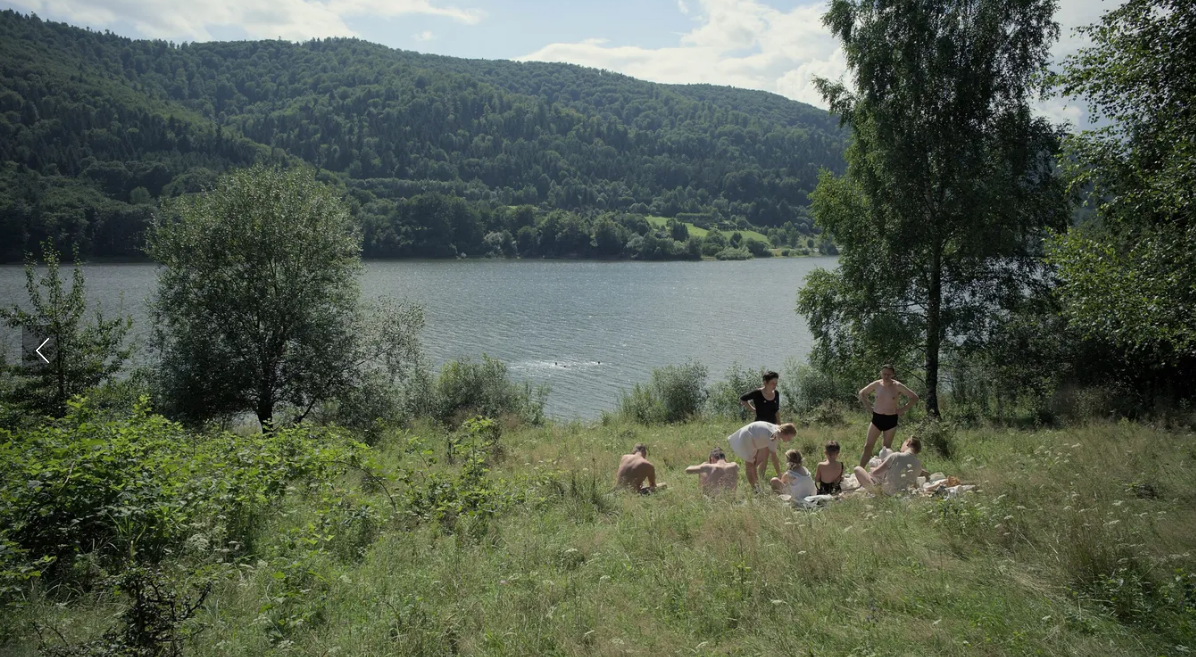TIFF '23: Take a trip down to hell with "The Zone of Interest"
 Friday, September 8, 2023 at 1:00PM
Friday, September 8, 2023 at 1:00PM  Jonathan Glazer's "The Zone of Interest"
Jonathan Glazer's "The Zone of Interest"
For my first day at TIFF, I planned on starting things off with a Sandra Hüller double feature, the Palme d'Or-winning Anatomy of a Fall followed by The Zone of Interest. The first half of that plan went kaput soon enough, so instead I caught Warwick Thornton's The New Boy. Expect more thoughts on that title next week – for now, it's Glazer time. In any case, what started as a morning predicated on Croisette honors and a German superstar morphed into an extended exercise in how cinema confronts historical atrocities, how parallel realities can coexist within the same landscape, and how sound can force you to see what your eyes do not…
Since its first screening in the South of France, Jonathan Glazer's latest has prompted critics to invoke Hannah Arendt's ideas about the banality of evil. Yet, the film's specificities bring other thoughts to the surface. The banality of evil is less critical to this cinematic edifice than the system it constructs to sustain itself. Unnerving psychologies are observed with clinical detachment, an eye towards the mundane ritual above the philosophical implications of choice or intention. Watching The Zone of Interest is closer to reflecting on the architecture of evil.
One can't confront Glazer's loose adaptation of Martin Amis' novel without at least an errant thought on its scenographic exactitude. Most of it is set at Auschwitz during the height of the Holocaust, but the camera never follows one of the poor souls imprisoned within its barbed wire, gas chambers, and incinerators. Instead, we're invited into the daily life of the Höss family, whose patriarch works as the camp's commander. "Invited" might be the wrong word. As an audience, you're trapped in their orbit, which brings a gradual onset of visceral nausea.
You want to move, but you can't. You want to see the ugly truth rather than experience it filtered through the nasty casualness of bored Nazi housewives. The camera's severity of composition amplifies that need for a freer movement, with numerous shots arranged to rhyme the rectilinear angles of the Höss estate. It's a hellish miracle of midcentury architecture before the war's end, boxes within boxes, frames within frames. Transparencies match the entrance with the greenhouse by the side. Gray walls encircle all, a few vines planted strategically so that, one day, the Höss' view will be more verdant. Oh, how the camera drinks in the genius of Chris Oddy's sets.
When the camera does move, the feeling persists, like your body is feeling the off-screen track setting the path. For the pastoral passages, when the compound's lines aren't there to further define Lukasz Zal's lensing, you still sense the carefulness of each and every shot, like you're caught inside the body of someone trying not to look at something with all their might. The neck spasms in phantom pain, the eyes twitch as they yearn for a broader canvas, one that's more easily slotted into prestige cinema's usual depictions of the Holocaust. As odd as this sounds, the interior of the gas chambers might have felt less upsetting than Hedwig Höss' Eden on Earth, flowers blooming from earth fertilized with prisoners' ashes.
The editing accentuates these visual dynamics, rhythms oscillating between the languorous and mechanically fleet. When a close-up inches us into the camp proper, horrible relief crosses with added anguish. The bang of lead white sky is painful to the eye, and the refusal to move from Höss perturbs so much more when the story's should-be rightful subjects sound their suffering beyond the frame's margins. Sound invades, only barely muffled by distance, concrete, malice. The sound of evil is the silence that you read in the characters' non-response to what you can plainly hear. Close your eyes, and you can see it, too.
Unlike the house, the noises beyond the wall are in no regimental symmetry to the Höss Nazi utopia. Mica Levi's astounding score is Moloch devouring the world, some sonic substance rising from cavern bowels deep within, expressing the atonal anguish when the screen image will not. Glazer's greatest trick is that the direct depiction of crimes against humanity becomes an unattainable comfort that the viewer instinctually tries to grasp. He makes you yearn for it, and then you'll have to live with that and all that it reveals. In The Zone of Interest, the historical past is the void that stares back.
The Zone of Interest is being distributed by A24, and scheduled for December 8th in the US.



Reader Comments (3)
Beautifully written as always Claudio. So excited for this film. I plan on seeing it by myself to let it wash all over me. Glazer has a great shot to get a Best Director nomination.
you really lost interest in sandra hüller after that opening sentence...
Michael R -- Thank you for reading and the praise. After watching the film, I actually started to doubt its chances as a major Oscar player. Then again, the directing branch has been known to have great taste lately.
par -- When planning my coverage, I thought about tackling this and ANATOMY OF A FALL through a Hüller focused lens, but since my plans were for naught, changing the approach felt right. She's terrific, as are most actors under Glazer's gaze, but this is no straightforward acting showcase. Just the scarcity of close-ups differentiates it from most fare that gets awards buzz. Also, her supposed placement as a Supporting Actress for campaign purposes is fraudulent as fuck.